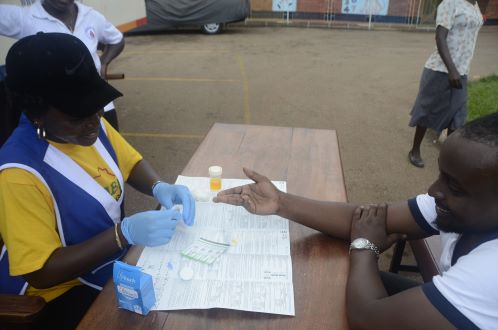A LEADING health organisation is urging governments across the world to unleash the power of grassroots communities across the world to lead the fight to end AIDS.
A new report by UNAIDS, Let Communities Lead, has concluded that AIDS can be ended as a public health threat by 2030, but only if communities on the frontlines get the full support they need from governments and donors.
Winnie Byanyima, Executive Director of UNAIDS said: “Communities across the world have shown that they are ready, willing and able to lead the way. But they need the barriers obstructing their work to be pulled down, and they need to be properly resourced.
Leaders
“Too often, communities are treated by decision-makers as problems to be managed, instead of being recognised and supported as leaders. Communities are not in the way, they light the way to the end of AIDS.”
The report, launched in London during a World AIDS Day event organized by the civil society organization STOPAIDS, found that community organisations have been the driving force for progress in tackling AIDS.

Community-led campaigning has helped secure key changes in policy and opened up access to generic HIV medicines. This has led to sharp, sustained reductions in the cost of treatment from US$ 25 000 per person per year in 1995 to less than US$ 70 in many countries most affected by HIV today.
According to Let Communities Lead investing in community-led HIV programmes delivers transformational benefits.
The report highlights how programmes delivered by community-based organizations in Nigeria were associated with a 64% increase in access to HIV treatment, a doubling of the likelihood of HIV prevention service utilization, and a four-fold increase in consistent condom use among people at risk of HIV. It also notes how, among sex workers reached by a package of peer-based services in the United Republic of Tanzania, the HIV incidence rate was reduced to below half (5% vs 10.4%).
The role that young people can play in helping to prevent HIV is also examined by Let Communities Lead.
“Young people’s voices are powerful, necessary and they are heard, we are a transformative generation and should not be overlooked,” said Mercy Shibemba MBE, a young, award-winning HIV advocate. “I am able to use the power of my voice to break down the stigma around HIV because of the support the HIV community has given me growing up. To serve communities well, you should do so ethically and meaningfully, which means they should take the lead in decisions that will directly impact them.”
Plans
UNAIDS is calling for Communities’ leadership roles to be made core in all HIV plans and programmes; Communities’ leadership roles to be fully and reliably funded; And for barriers to communities’ leadership roles to be removed.
Despite the clear evidence of community-led impact, community-led responses are unrecognized, under-resourced and in some places even under attack. Crackdowns on civil society and on the human rights of marginalized communities are obstructing communities from providing HIV prevention and treatment services.
Speaking about the report’s findings at its London launch Andrew Mitchell, Minister of State for Development and Africa said: “I am extremely concerned about the exclusion from health services of key populations like the LGBT+ community. The UK champions the rights of such communities, and we will continue to protect them, working closely with our partners in civil society. I thank UNAIDS for keeping us focused on the inequities driving the pandemic and I look forward to working with our partners to champion the voice of people living with HIV and end AIDS as a public health threat by 2030.”


Comments Form